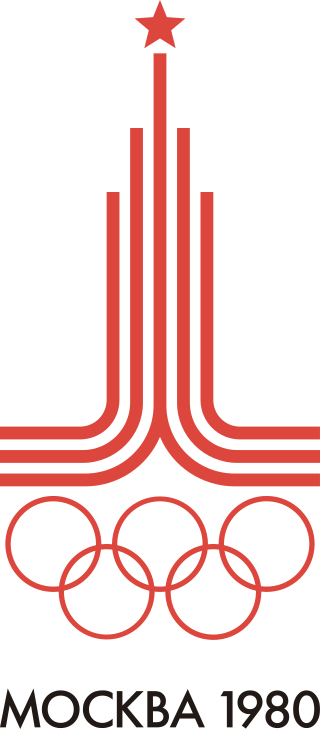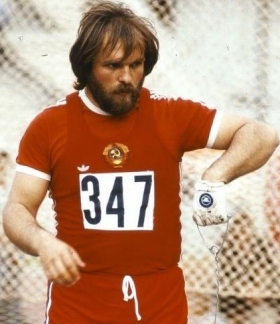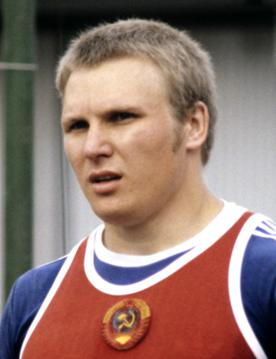Lyudmila Andreyevna Kondratyeva is a Russian former track and field athlete, who competed for the Soviet Union and is the 1980 Olympic 100 m champion.

The 1980 Summer Olympics, officially known as the Games of the XXII Olympiad and officially branded as Moscow 1980, were an international multi-sport event held from 19 July to 3 August 1980 in Moscow, Soviet Union, in present-day Russia. The games were the first to be staged in an Eastern Bloc country, as well as the first Olympic Games and only Summer Olympics to be held in a Slavic language-speaking country. They were also the only Summer Olympic Games to be held in a socialist country until the 2008 Summer Olympics held in China. These were the final Olympic Games under the IOC Presidency of Michael Morris, 3rd Baron Killanin before he was succeeded by Juan Antonio Samaranch, a Spaniard, shortly afterwards.

Yuriy Georgiyevich Sedykh was a track and field athlete who represented the Soviet Union from 1976 to 1991 in the hammer throw. He was a European, World and Olympic Champion, and holds the world record with a throw of 86.74 m in 1986.

The Soviet Union (USSR) competed at the 1976 Summer Olympics in the city of Montreal, Quebec, Canada. 410 competitors, 285 men and 125 women, took part in 189 events in 22 sports. As the country hosted the next Olympics in Moscow, a Soviet segment was performed at the closing ceremony.

The Soviet Union (USSR) was the host nation of the 1980 Summer Olympics in Moscow. 489 competitors, 340 men and 149 women, took part in 202 events in 23 sports.

The Soviet Union (USSR) competed, for the last time before its dissolution, at the 1988 Summer Olympics in Seoul. 481 competitors, 319 men and 162 women, took part in 221 events in 27 sports. Athletes from 12 of the ex-Soviet republics would compete as the Unified Team at the 1992 Summer Olympics, and each nation would field independent teams in subsequent Games.

Jüri Tamm was an Estonian hammer thrower and politician. Representing the USSR, he won a bronze medal in the 1980 and 1988 Summer Olympics and a silver medal at the 1987 World Championships in Athletics. He set the world record for the hammer in 1980.

Sergey Nikolaevich Litvinov was a Russian hammer thrower and athletics coach. He competed at the 1980 Summer Olympics and the 1988 Summer Olympics, missing the 1984 Summer Olympics due to the Soviet boycott, and won a silver and a gold medal, respectively. He also won two world titles, in 1983 and 1987. After retiring from competitions he coached elite hammer throwers including Ivan Tsikhan and his son Sergey.

The men's hammer throw was one of four men's throwing events on the Athletics at the 1964 Summer Olympics program in Tokyo. It was held on 17 October and 18 October 1964, with the qualification on the first day and the final the next. 25 athletes from 14 nations entered, with 1 not starting in the qualification round. The maximum number of athletes per nation had been set at 3 since the 1930 Olympic Congress. The event was won by Romuald Klim of the Soviet Union, the nation's second consecutive victory in the men's hammer throw. Gyula Zsivótzky of Hungary repeated as silver medalist, the fifth man to win multiple medals in the event. Uwe Beyer took bronze, the first medal for the United Team of Germany and the first medal for any German hammer thrower since 1952.
Natalya Venediktovna Lisovskaya is a Russian former athlete who competed mainly in shot put for the Soviet Union. Lisovskaya trained at Spartak in Moscow.

The men's hammer throw was an event at the 1996 Summer Olympics in Atlanta, Georgia. There were 37 competitors from 22 nations, with twelve athletes reaching the final. The maximum number of athletes per nation had been set at 3 since the 1930 Olympic Congress. The eight highest-ranked competitors after three rounds qualified for the final three throws to decide the medals. The qualification mark was set at 76.50 metres. The event was won by Balázs Kiss of Hungary, the nation's first victory in the men's hammer throw since 1968 and fourth overall. Lance Deal earned the United States' first medal in the event since 1956 with his silver. Oleksandr Krykun's bronze gave Ukraine a medal in its debut as an independent nation.

The men's hammer throw was an event at the 1992 Summer Olympics in Barcelona, Spain. There were 27 participating athletes from 19 nations. The maximum number of athletes per nation had been set at 3 since the 1930 Olympic Congress.

The men's hammer throw at the 1988 Summer Olympics in Seoul, South Korea had an entry list of 30 competitors from 16 nations, with two qualifying groups before the final (12) took place on Monday September 26, 1988. The maximum number of athletes per nation had been set at 3 since the 1930 Olympic Congress. In the final round the eight highest-ranked competitors after three rounds qualified for the final three throws to decide the medals. The event was won by Sergey Litvinov of the Soviet Union, the nation's sixth victory in the event. The Soviet team completed the medal sweep, with Yuriy Sedykh taking silver and Jüri Tamm bronze. It was the Soviets' third medal sweep in four Games, with only the boycotted 1984 Games missing. The 1988 team was the same as the 1980 squad, with Litvinov and Sedykh trading places. Litvinov and Tamm were the ninth and tenth men to earn multiple medals in the hammer throw, while Sedykh became the fourth to win three medals; his two golds and a silver trailed only John Flanagan's three gold medals in Olympic success.
The men's discus throw at the 1984 Summer Olympics in Los Angeles, California had an entry list of 20 competitors from 14 nations, with two qualifying groups before the final (12) took place on August 10, 1984. The maximum number of athletes per nation had been set at 3 since the 1930 Olympic Congress. The event was won by Rolf Danneberg of West Germany, the nation's first medal in the men's discus throw and the first victory by any German athlete in the event. Mac Wilkins and John Powell of the United States won silver and bronze; they were the eighth and ninth men to win multiple discus throw medals. The United States continued its 19-Games streak of earning at least one medal every time it appeared, missing the podium only in the boycotted 1980 Games; however, this would be the last Games in that streak—and, in fact, the last medals the United States would earn in the event through at least 2020.

The men's hammer throw was an event at the 1984 Summer Olympics in Los Angeles, California. There were 23 participating athletes from 13 nations. The maximum number of athletes per nation had been set at 3 since the 1930 Olympic Congress. The eight highest-ranked competitors after three rounds qualified for the final three throws to decide the medals. The qualification mark was set at 72.00 metres.
The men's discus throw event at the 1980 Summer Olympics in Moscow, Soviet Union had an entry list of 18 competitors from 12 nations, with one qualifying group and the final (12) held on Monday July 28, 1980. The maximum number of athletes per nation had been set at 3 since the 1930 Olympic Congress. The event was won by Viktor Rashchupkin of the Soviet Union, the nation's first medal and first victory in the men's discus throw. Imrich Bugár put Czechoslovakia back on the podium in the event after a one-Games absence, taking silver. Luis Delís earned Cuba's first men's discus throw medal with his bronze. The United States, which had earned at least one medal in every appearance of the event prior to 1980, missed the podium due to the boycott.
The men's shot put event at the 1980 Summer Olympics in Moscow, Soviet Union had an entry list of 16 competitors from 11 nations. The maximum number of athletes per nation had been set at 3 since the 1930 Olympic Congress. The final was held on Wednesday 30 July 1980, with the qualifying round staged two days earlier in the Lenin Stadium. The top twelve and ties, and all those reaching 19.60 metres advanced to the final. The event was won by Vladimir Kiselyov of the Soviet Union, the nation's first victory in the men's shot put. The Soviet Union became only the third nation to reach the podium in consecutive Games in the event, as East Germany became the second to reach a three-Games streak on the podium as Udo Beyer took bronze. Beyer and Aleksandr Baryshnikov became the ninth and tenth men to win multiple medals in the shot put.

The men's hammer throw competition at the 1976 Summer Olympics in Montreal, Quebec, Canada took place on 26–28 July. There were 20 competitors from 13 nations. The maximum number of athletes per nation had been set at 3 since the 1930 Olympic Congress. The event was won by Yuriy Sedykh of the Soviet Union, the nation's second consecutive and fourth overall victory in the men's hammer throw. The Soviets swept the medals, with Aleksey Spiridonov taking silver and defending champion Anatoliy Bondarchuk earning bronze. It was the third medal sweep in the men's hammer throw. Bondarchuk was the seventh man to win multiple medals in the event.
Oksana Yurevna Kondratyeva is a Russian track and field athlete competing in the hammer throw. Her personal best of 77.13 m ranks her in the all-time top ten of the event. She represented Russia at the 2013 World Championships in Athletics, placing seventh.

The men's hammer throw was a competition at the 2016 Summer Olympics in Rio de Janeiro, Brazil. The event was held at the Estádio Olímpico João Havelange between 17–19 August. There were 32 competitors from 24 nations. The event was won by Dilshod Nazarov of Tajikistan, the nation's first medal in the men's hammer throw and first gold medal in any Olympic event. Ivan Tsikhan of Belarus took silver, the 14th man to win multiple medals in the event in adding to his 2008 bronze. Bronze went to Wojciech Nowicki of Poland, the nation's first medal in the event since 2000.











